Zur deutschen Fassung dieses Artikels.
123
Although it’s a local bus, operated by the City of Füssen, bus no. 78 shows the destination only in English: “Hohenschwangau Castles”. This must be the loss of German culture that some people are worried about.
However, there are no international tourists sitting next to me, only drowsy schoolchildren.
At the Powder Tower, a girl gets on the bus: “I forgot my bus pass.”
The driver doesn’t make her pay. He doesn’t reprimand her. Instead, he prints two tickets: “The other one is for the way back home.”
In Hohenschwangau, the bus driver calls out “king – castle – wonderful”, also in English.

I left at 7:30 a.m. to arrive at the ticket center in time before 8 a.m. There are about 15 people in front of me; that could still work. One spot ahead of me, there is a man from Fulda who immediately drove to Bavaria when the newspaper wrote “Neuschwanstein is open again”. He, too, has to remark: “There are no Chinese or Japanese here this year”, although Australians and New Zealanders would be even more harmful to the environment.
Very annoying, especially so early in the morning, is a woman behind me in the queue. She is yelling into her phone, very loudly and importantly, at people who seem to be her subordinates about schedules, room allocation plans, Excel spreadsheets and other unimportant things. Her two daughters don’t have mobile phones, probably put off by the mother’s deterring example.
124
When it is my turn to enter, I look back again. Now, there are at least 150 people behind me. The appeal by the Federal Health Minister to holiday in Germany this year is having an effect. Whoever sleeps in or insists on breakfast loses.

Everything is strictly streamlined and very efficient, much like at the Tokyo subway counter. Maybe that’s why the Japanese like coming here so much? If I hurry, I could even enjoy the first guided tour of the day at Hohenschwangau Castle, the ticket saleswoman is offering.
But I don’t want to hurry.
All right, 9:40 then?
Okay.
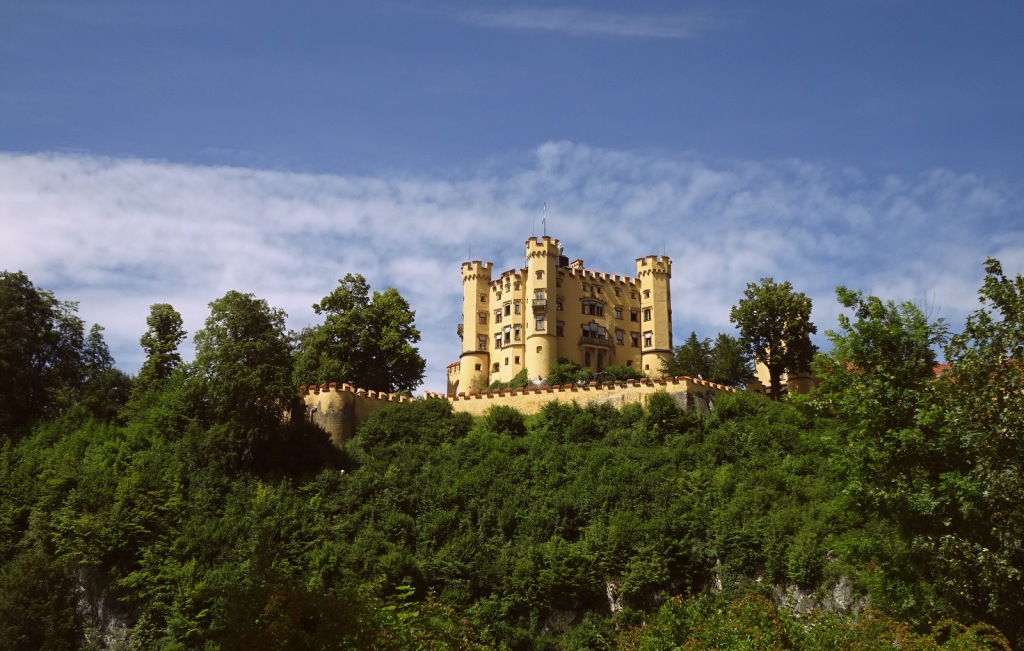
“And Neuschwanstein at 11:00? You can manage that if you walk briskly.”
Neuschwanstein is situated on a mountain, it is about 40 minutes by foot and I don’t feel like rushing at all.

“So 11:30?”
I have to fight my way to slowness, pleasure and relaxation until I get a ticket for 13:30. Apparently, they usually deal with visitors who still have to go to Munich or Hallstatt in the afternoon.
125
Looking at the receipt leads to twofold horror, one financial, one historical.

The two castles cost 30 €, which I would not have been able to afford without the generous donations by readers. So, if you enjoy the upcoming guided tour through the magnificent royal castles, please thank the noble donors.
And secondly, the invoice was not issued by the State of Bavaria, but by the Wittelsbach Compensation Fund. This sounds beautifully antiquated and equitable, but in reality it means that the State of Bavaria or the municipality of Schwangau put in the work, but the money goes to the family of the former kings.
This weird arrangement is a consequence of the rather benign Bavarian revolution of 1918: While elsewhere, kings and emperors were exiled or executed, in Bavaria, people sat together over a beer and haggled over what was to belong to the Free State and what was to belong to the Wittelsbach family.
As was customary in peaceful Bavaria, the negotiations culminated in a compromise in 1923, according to which part of the castles and properties became state property and the other part remained with the Wittelsbach family. This quite obviously arbitrary solution, probably reached by playing cards, was not complicated enough to justify several years of negotiations. Thus, a few more foundations were set up to look after the art treasures, which in turn lent them to museums. Boards of directors and state commissioners were appointed. And they invented words like “Domanialfideikommisspragmatik” and “Pinakoglyptohypothek”, so that no one would ever dare to ask.
For today, it shall suffice to know that Neuschwanstein Castle is state property, but that the Museum of the Bavarian Kings and Hohenschwangau Castle are owned by the Wittelsbach family. Therefore, there is no student discount for the latter. The kings need every euro.
126
A small detour leads me to Frauenstein Castle.
Oh, that one is already out of order. A memorial stone in the forest is all that remains.
Good thing I didn’t fall for the scam with the online tickets for apparently no longer existing castles.
127
But as I turn around, I see them: the two castles, brutally planted into the landscape.
I always find it very provincial when the child (upper castle) builds in the immediate vicinity of the parents (lower castle). “Well, here I had the property”, says the spoiled son and still brings the laundry to mom for ironing. I have a hard time understanding people who don’t want to explore the world at a young age, who never want to travel to Transylvania, who aren’t lured to Lusaka, drawn to Dar-es-Salaam or tempted by Tibet.
128
Only later did he want to leave, when he was fed up with Bavaria. Or rather, when he was fed up with Germany. The foundation of the German Empire in 1871 was perceived by King Ludwig II as a defeat for Bavaria and for himself. He was no longer the supreme, unconditional ruler, but rather contained and constrained and relatively irrelevant in this new empire, which, to make matters worse, was ruled by the loathed (and indeed loathworthy) Hohenzollern clan.
But King Ludwig II did not simply want to go into exile and write like Ovid, the Mann brothers or Anna Seghers. No, he was really upset and defiantly wanted to seek another country where he could become an absolute ruler with unlimited power.
For this purpose, he dispatched Columbuses and set up a commission. Royal officials traveled to and explored the Canary Islands, Cyprus and Crete. The fact that he was only looking for islands says a lot.
The royal commission under Admiral Canaris chose the Canary Islands as the most suitable location, calculated the expenses for the acquisition of the islands, planned the negotiations with Spain and England and drew up a constitution for the “Canary Island Kingdom”.
And then, it all came to nothing.
Fortunately for the Canary Islands, who narrowly managed to escape the fate of a royal colony and have been leading a relaxed life ever since.

On the other hand, now the Canary Islands are stuck with the Bourbons. With all these dynasties, you can’t tell which one is worse. Well, actually, you can: the Hohenzollern.
129
This plan for the Canary Islands, which by the way has been hushed up in many reports, exhibitions and films about Ludwig II, seems ludicrous from today’s point of view.
But there have been enough examples of German nobles emigrating to become king elsewhere. The uncle of Ludwig II, Otto, became the first King of Greece in 1832. Today, the Greek parliament convenes in the palace once built for the Bavarian, and the blue and white in the Greek flag are the Bavarian colors.
However, this foreign assignment did not end well. In 1862, after 30 years of reign, there was an uprising or military coup, and King Otto had to go into exile. He moved back to Bavaria, where he decreed that every town should have a Greek restaurant, because he missed souvlaki and gyros.
The Greeks chose a prince from Denmark as his successor, a mistake that no one who has read Shakespeare’s “Hamlet” would have made. But the Greeks always thought a lot of their own dramas and tragedies and ignored all foreign literature.
But I am digressing like Hamlet, I think, and you finally want to go inside the castle.
130
Ludwig II is always associated with Neuschwanstein Castle, although he only spent 172 days there. If one wants to get closer to his thinking and feeling, however, one must go to Hohenschwangau Castle and soak up the castle and scenery that shaped the later king during his childhood.
Soaking up the scenery could become difficult, however, because the annoying telephone woman from the queue is also in the tour at 9:40 am, and she is also annoying when she is not on the phone. Now she wants to take pictures of her daughters all the time and is upset that visitors are not allowed to take photos in the castle. I am absolutely fine with that, because it allows me to concentrate on observing, listening and writing.
131
On the site of the castle, a robber baron’s castle had long stood, which was repeatedly besieged and destroyed, most recently by Napoleon, who apparently could not even calm down in the relaxing scenery of mountains and lakes. (Strange that everyone is angry about Japanese and Chinese tourists, but nobody blames the French for their destruction.) After that, the castle was forgotten for 30 years, until Crown Prince Maximilian discovered the ruins on a hike, which, as I can confirm as an experienced hiker, happens quite often. The later King Maximilian II, the father of Ludwig II, bought the castle and had it restored as a royal vacation home, which, as I can tell you as an experienced hiker, happens very rarely.
Nor is there any reason to overreact in this property-purchasing manner, because the views and the rustling of the leaves can be enjoyed, as this hike has proven, without owning any of it. In Bavaria, the unadulterated enjoyment of natural beauty even has constitutional status, postulated in the poetic Article 141 paragraph 3 of the State Constitution:
The enjoyment of natural beauty and recreation in the outdoors, in particular the access to forests and mountain meadows, the use of waterways and lakes and the appropriation of wild fruit to the extent customary in the respective region shall be permitted to every person. In this respect, every person shall be obliged to treat nature and the landscape with care. The state and the municipalities shall be entitled and obliged to maintain free access to mountains, lakes, rivers and other beautiful sceneries and to create free access by restricting property rights and to create hiking trails and recreational parks, if need be.
A human right to hiking and to sitting by the lake, ain’t that great?
132
Hohenschwangau is held in the spirit of historicizing late romanticism. Fearing that the children would not read any picture books, the royal parents decorated the walls of all rooms with picture stories from medieval legends and family history.

The dining room is the swan knight’s hall. The composer Richard Wagner, whose greatest fan and patron Ludwig II was, often stayed at Hohenschwangau Castle. Wagner got a piano and the guest room with the most beautiful view over the Alpine Lake. Unfortunately, the composer did not look out of the window, but at the kitschy paintings. That’s why we got this heroism crap from him instead of music that captures the landscape like Smetana‘s or Čiurlionis‘.

133
Because Ludwig II had money and bad taste, Richard Wagner kept showing up. When dealing with Ludwig II, the question of whether he was a good or a bad king, whether he was crazy or just special, pops up at every turn. This can be discussed back and forth, as I am hoping to show in this series of articles. But one thing is indisputable: The low point in the king’s resume is the promotion of the dubious composer. Without Ludwig II, Wagner would have been broke and we would have been spared hours of pompous singing. Or he would have continued to make hip-hop, for which he had already been in prison.
But even at this darkest spot of the monarch, I must point out the ambivalence that defies any unambiguous assessment of Ludwig II. When Wagner asked for the court orchestra for the first performance of “Parsifal” in Bayreuth in 1881, he expressly excluded the conductor Hermann Levi from this request because he was Jewish. The king reacted honorably and resolutely. He wrote to Wagner that he could have the orchestra, but only with the conductor. He tolerated “no difference between Christians and Jews,” for: “Nothing is more disgusting, more unpleasant than such disputes. After all, all people are basically brothers, regardless of denominational differences.” This must have really rankled Wagner, who was a fierce anti-Semite.
Unfortunately, in the further course of German history, the Wagners prevailed. The moral of the story: No money for anti-Semites! Ludwig II would have saved himself this – and perhaps incapacitation and death – if he had known that you can support my blog from only 2.99 thalers per month and receive instructive articles, guaranteed without fanfare and trombone.
134
Another room in the castle is dedicated to the supposed ancestors of the Wittelsbachers and shows crusaders and Normans and battles.
The pictures are very romanticizing. Even in the most violent battle paintings, there is no blood, no open wounds. After all, one was supposed to dine in front of the painting. For Otto, the brother of Ludwig II, this led to a rude awakening when he actually took part in the Franco-Prussian War and was traumatized. The world is not a painting after all.
Incidentally, Ludwig II incapacitated his younger brother in 1878, which is why after the death of Ludwig II, he became King of Bavaria only in title, but the official business was taken over by Prince Regent Luitpold. In the last days of his life, Ludwig II may have regretted his brother’s incapacitation, for anyone who wildly incapacitates within his own family is later in a difficult position to argue against his own incapacitation. Instead of listening to Wagner’s Valkyrie, the young king would have done better to read about Kant’s Categorical Imperative.
135
I guess I finally have to tell the story of the incapacitation of King Ludwig II:
If you grow up in a castle like that and don’t go to school with normal children, you become a little strange. (Another reason against private schools.) On top of that, Ludwig II was torn between an absolutist understanding of power, which could not be reconciled with the relatively modern Bavarian constitution (see chapter 86), on the one hand, and rather modern socio-political views, which culminated in reported statements that he was actually a republican and deemed the monarchy a stupid idea, in which he was undoubtedly right, on the other hand, which led to similar confusion as might befall the readers who are getting tangled up in one of my convoluted sentences, although they should appreciate the fact and the information about the fact that I produce far more elaborate linguistic labyrinths in German.
How does one react to such a conflict?
Very simple: You switch off your cell phone and go into hibernation.
Ludwig II became more and more shy of people, hardly ever making an appearance in Munich. Well, nobody likes Munich, but in the king’s case, it was problematic because Munich was the capital of the kingdom and government and parliament were working there.
Hohenschwangau and Neuschwanstein are more than 100 km away, which made cooperation with the ministries and authorities difficult.
“I should be allowed to work in the home office,” said the king, who had a lifelong fear of typhus, plague, yellow fever and HIV. So the ministers had to travel by coach into the mountains just to have a document signed. (Without the king’s signature a law could not become law.)
From 1870 on, Ludwig II did not even receive his government’s ministers, but carried out all business by mail. He was practically a virtual king that no one ever saw again.
136
All the paperwork annoyed Ludwig II, which everyone can understand who has letters from the DMV and the IRS piling up, and he increasingly withdrew into private life and his two hobbies: building castles and listening to operas.
That the former is very expensive is self-evident. But the king also made the enjoyment of music an expensive business. Instead of a record, he ordered the entire theater ensemble to his home or to one of the opera houses, which was then closed to the public. And the king sat all alone in the auditorium, because he had no friends. By the way, this is very frustrating for the artists, because artists – like bloggers – want an audience.
137
“Follow the money,” say criminologists when they want to get to the bottom of a case, and that’s the way it is here.
In chapter 87, I had already mentioned that the Bavarian royal family was actually broke, and that Prussia was stepping in with annual payments of at least 300,000 marks.
But now it becomes tricky: These payments were secret. It was black money. Illegal. Corruption.
Because Prussia did not pay to the Kingdom of Bavaria, but set up a secret fund (the “Welfs’ Fund”), out of which a total of 5 million marks was paid via Swiss banks – whom else? – into private accounts of Ludwig II.
We recall that Prussia had bought the approval of the Bavarian king for the foundation of the German Empire that way. In other words, the Bavarian king had sold, or rather flogged the independence of Bavaria because of his mania for building castles. The castles that are now globally regarded as symbols of Bavaria actually put the rope around Bavaria’s neck.
This is a prime example of high treason. Which carries the death penalty.
So King Ludwig II lived under constant fear that Prussia would either stop payments or that the financial entanglements would become public.
In April 1886, the time had come. Bismarck, the German chancellor, had realized that Ludwig II’s financial demands were a bottomless pit. Perhaps he simply no longer needed him after the foundation of the Reich was completed and consolidated. And thus, Bismarck informed the Bavarian government.
138
The Bavarian cabinet quickly came to a conclusion: The king must be removed.
But not like in France, with guillotine and blood in the streets. No, it had to happen inconspicuously and surreptitiously.
On 7 June 1886, the cabinet commissioned the psychiatrist Bernhard von Gudden to give an expert opinion on the king’s state of mind. Gudden, who had already declared Otto of Bavaria mentally ill (chapter 134), accepted the commission.
The next day, the report was finished.
Of course, such a quick and efficient procedure is only possible if, contrary to all medical and legal rules, the person concerned is not personally examined, a practice that is still used in Bavaria when dubious million-euro deals have to be covered up.
Before the cabinet published the decision to remove the king from office on 10 June 1886, they asked Prince Luitpold for an assurance that the administration would remain in office unchanged. Prince Luitpold agreed, and in return he became regent, i.e. de facto king. The ministers had dismissed all alternatives, such as the voluntary abdication of Ludwig II.
Essentially, this was a coup d’état.
Who would deliver the news to the king? How would the king react? Why did the king have to die? And, even more mysteriously, why did Doctor Gudden have to die?
We will resolve all this in the next episode. Now, let’s continue our tour of Hohenschwangau Castle.
139
In the bedroom, there are pictures of an oriental journey.

In the ballroom, the Wilkina saga is celebrated. Because the kings were not quite sure of their own education, all paintings are labeled. That way, I learn that the flying dragon from the Never-Ending Story is called Sintram.
In the walls, there are 50 cm wide tunnels for the staff, who had to feed wood to the tiled stoves from behind. Why the Wittelsbachers could not do this themselves is unclear, but then, snobbish people still act like that today. Some, for example, cannot pick up a pizza, instead chasing poorly paid couriers through the city and the rain.
140
Above, I wrote that you have to know Hohenschwangau Castle to understand the childhood of Ludwig II, but actually it went beyond that. Even as king, he lived in this castle for another 20 years.
Not because he wanted to, but because he had to. Neuschwanstein was a mega project that was not finished from one day to the next. (Well, if the Chinese had come at that time, they would have completed it in a week. And on top of that, they would have put down the revolution.) In a bay window of Hohenschwangau, there is a telescope with which Ludwig II followed the construction progress of his dream castle. He had to wait 17 years. If you got nothing else to do in the meantime, that can easily drive you crazy.

141
Due to the corona virus, the group size for guided tours is limited to 10 people, which is quite pleasant. “Usually, we have 45 people in the group,” says the guide, and I can hardly imagine how crowded this would be in some rooms. “As a consequence, you will not see the castle as it was handed over to the public as a museum in 1913. We have had to increase the available space and have therefore removed the bookshelves from the walls, for example”.
Oh great, exactly the most interesting things were banished to the basement. Instead, there are replicas of some fountains and a lot of silverware around.
142
Speaking of the tour:
I mentioned in chapter 125 that this castle is privately owned by the Wittelsbach family. That made me fear that the tour would glorify the monarchy and that one would be asked to join the secret society of the Guglmen when leaving. (I removed the chapter on the Guglmen after anonymous threats. But you can gugl them yourself.)
It isn’t like that at all. Quite the opposite.
The young woman points out that Ludwig II was not that popular as a king. “He had to fight two wars, joined the German Reich, wasted money and practically never showed himself to the people.”
Prince Regent Luitpold, on the other hand, the successor, was much more popular: “He ruled for the longest period of peace and was very affable, almost normal. You could meet him in Munich when he took his dog for a walk in his lederhosen.”
It seems that the Bavarian kings, except for Ludwig II, were very fond of walking through the parks of Munich. One episode shows how banal historical events can be: The news of his downfall reached King Ludwig III on 7 November 1918 during an afternoon walk in the park. Two passers-by, who were better informed than the ruler, were kind enough to warn him: “Majesty, you better go home. They are having a revolution.” The king walked back to the residence, where servants and guards had already fled. He packed his wife, his children and a few things into the car and drove into exile to Austria. In the hurry, he had forgotten to pack underwear, which the revolutionary leader and new Prime Minister Kurt Eisner mailed him a few days later.
If everyone cooperates, revolution can be that simple. You don’t have to put on a drama show for ten years like in France.
143
The tour lasts only 30 minutes. The schedule is tight because the next group is already on our heels. But thankfully, the guide offers that we can ask her questions afterwards in the garden. “If Ludwig II was not exactly popular during his lifetime,” I ask, “when and why did the transfiguration and nostalgia begin that continue to this day?”
“Only in post-war Germany, really,” is the astonishing answer. “That was also the time when the Sisi films became popular.”
This makes me realize: “It’s almost like reaching desperately for something in the far-away past to cover up the more recent past.”
“Of course,” she says, and it’s a pity that such aspects are not addressed during the guided tours.
144
Because I have allowed myself sufficient time between the castles, I can still enjoy the garden of Hohenschwangau Castle. On one side you can see the mountains that mark the border of the kingdom, on the other side the ruled-over land.
The gardener responsible for this splendor tells me that nowadays, there are 280 visitors a day, while usually there are 3000 a day. He seems very relaxed and offers me a royal mandarin.
145
On the way back to the valley, I can see for myself how down to earth Prince Regent Luitpold is. Just as I pass a panel with his portrait, he walks up the hill. Without any entourage or adjutant. And he doesn’t even mind that I mention the coincidence and take a photo of him.

(If anyone recognizes the gentleman, who was visiting from Denmark, please tell him about this article.)
146
By noon, desperate and crying tourists, who failed to get tickets to Neuschwanstein Castle, are standing in front of the ticket center.
Wife: “Why didn’t you organize tickets?”
Husband: “Because I asked you repeatedly at what time of day I should book. And you said that planning constrains you and that you want to be spontaneous.”
Wife: “But you should have told me that the tickets will be sold out.”
Husband: “That’s why I tried to leave early and not have breakfast for hours.”
Wife: “This is not a vacation. You are turning everything into stress!”
Beginners think that travelling is romantic, but in reality, many relationships begin to fail on the first trip together. (One example. And another one.)
If I had been more business-minded this morning, I would have bought several tickets for the afternoon and could now sell them for twice or thrice the price. In front of the Alhambra in Granada, someone even offered me five times the price of my ticket. But because the readers were waiting for an article about the Alhambra, I had to decline. That was two years ago. I still haven’t gotten to that article. :-(
147
I really wanted to tell you about Neuschwanstein Castle today. But as you can see, this article has become so long again that we have to move the fairy tale castle to the next article.
Patience! After all, the king waited quite a while, too.
Links:
- Here you can find all articles about King Ludwig Trail. The report about the next stage will be published next week. Just check in regularly or get an e-mail subscription to make sure that you won’t miss anything.
- There are more reports about hikes from all around the world.
- Reservation of tickets for both royal castles.
- The tickets for the two castles cost a hefty 30 €. I just wanted to go for a peaceful walk, but at the end of the trip, I will be as bankrupt as Ludwig II. Any support for this blog is therefore most welcome, even from Prussia.




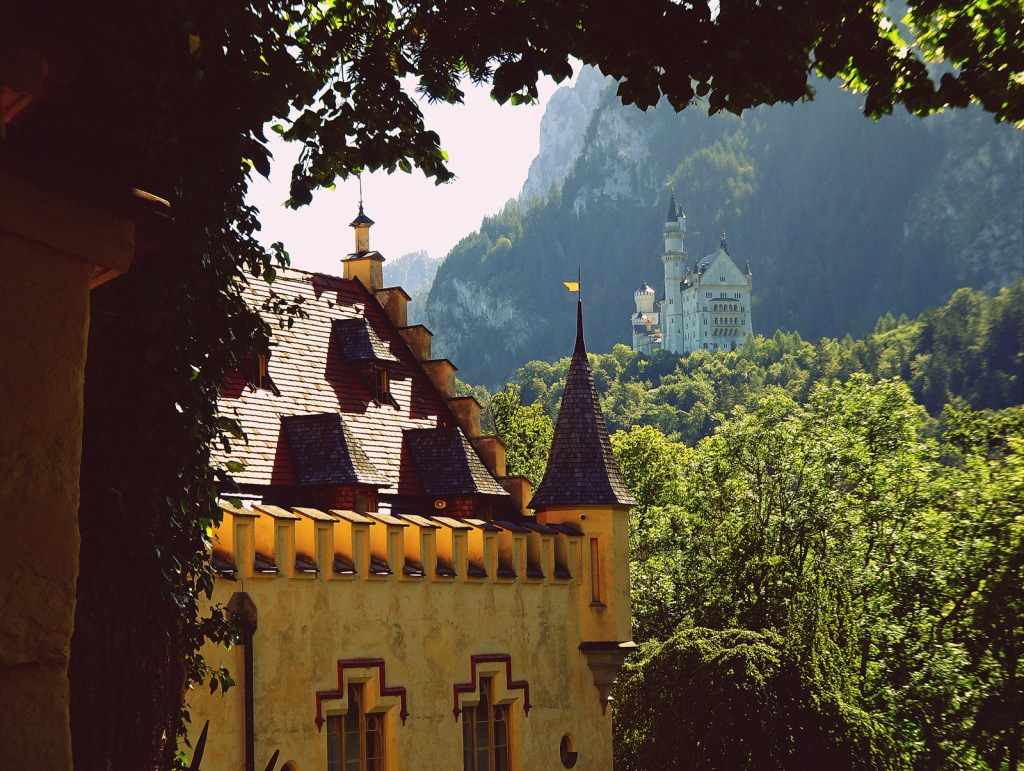
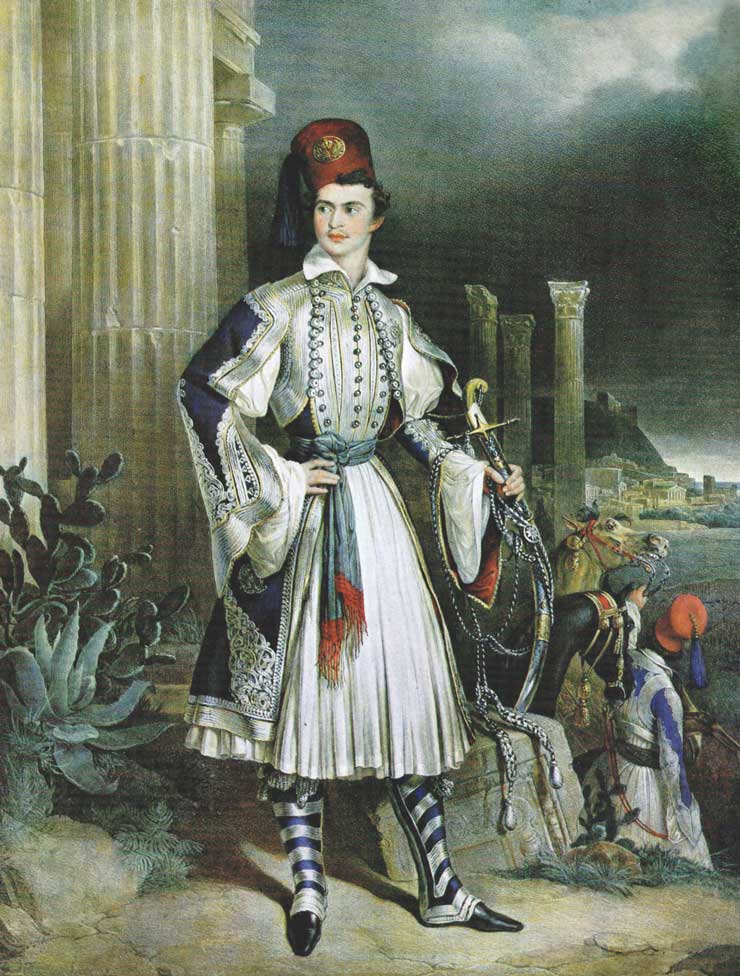


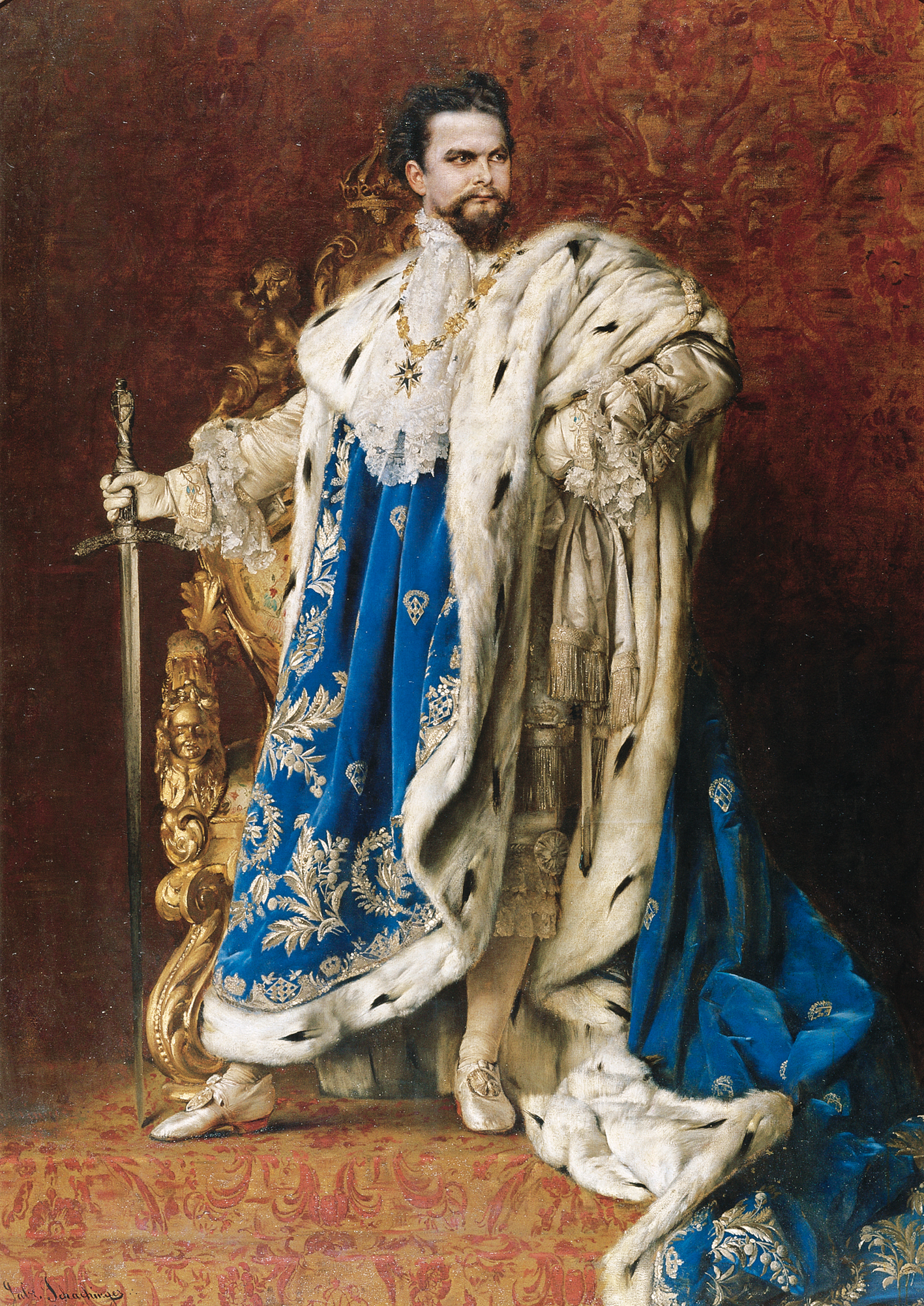
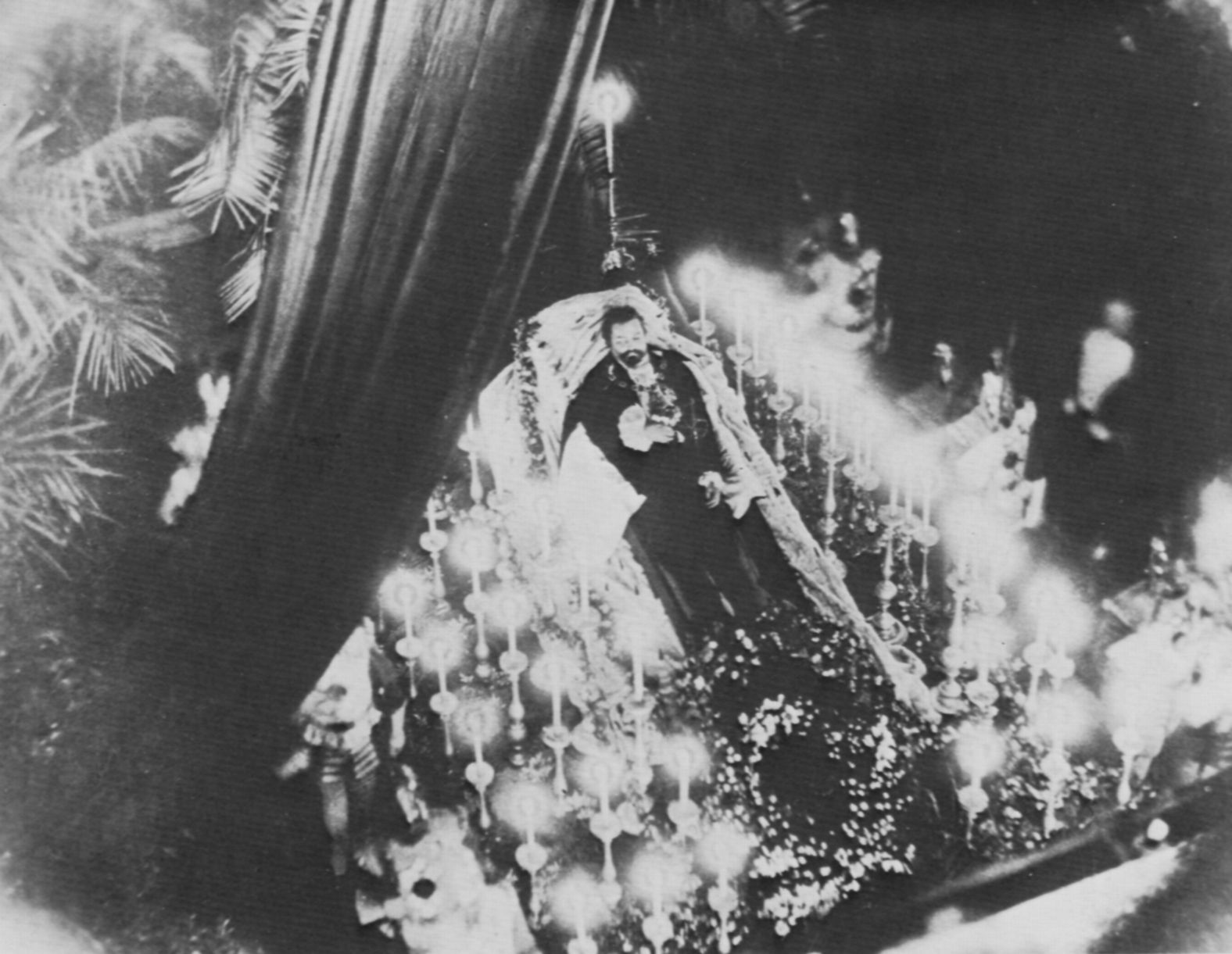







I love Article 141 paragraph 3 of the State Constitution! Every country should have laws giving ALL people access to the beauty of Nature, instead of fencing it off and selling it to the obscenely wealthy. Especially since they’re too busy appreciating themselves or their money to even notice the landscape where they built their huge house.
What are those things that look like giant Lego blocks in chapter 144?
Your writing always makes me laugh! Its educational and entertaining. I can see why you didn’t want to be a lawyer anymore😂😂
Thank you for another great virtual tour! I’m enjoying this hike, and my feet aren’t even tired.
Oh, these are merlons. (I had to look up the word.)
The photo was taken inside the castle garden, on top of the wall. (You can see it from the outside in chapter 124, it’s the lower wall there. [How good that I am numbering my chapters. ;-) ] )
So they are! Interesting how different angles can totally change a picture. That latter one doesnt look like a wall… it just looks like giant Lego blocks😂
Thank you!